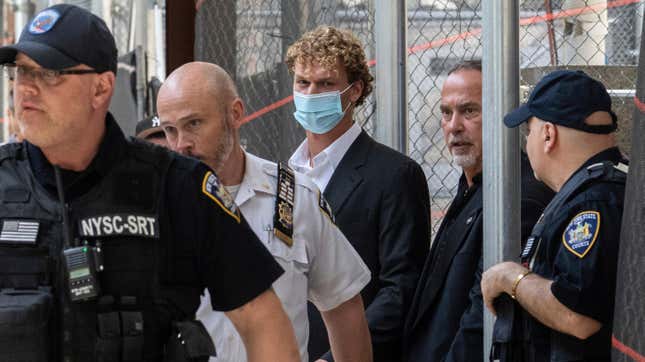
Two days ago, Daniel Penny—the 24-year-old man who choked Jordan Neely to death May 1 on the New York City subway—was finally arraigned and criminally charged in a Manhattan court. He is facing a felony charge of second-degree manslaughter and could receive up to 15 years in prison. Neely, a homeless man who had a history of mental illness, cried out for food and shelter shortly before Penny approached him from behind.
“I don’t have food, I don’t have a drink, I’m fed up, I don’t mind going to jail and getting life in prison. I’m ready to die,” Neely said, according to witnesses. He never assaulted or physically threatened anyone on the train before the incident. A bystander recorded the killing on his phone, in which the former U.S. Marine placed Neely in deadly chokehold for several minutes. Two other passengers helped Penny by restraining Neely’s arms. Police arrived on the scene and found the victim unconscious; Neely was pronounced dead shortly after.
Penny was questioned by authorities and released without any charges being filed. It was only after public outcry that criminal charges were finally brought against him. Neely’s death has triggered conversations about the lack of resources in New York for its homeless and mentally ill population, a point that Mayor Eric Adams was quick to emphasize in his address about Neely’s killing last week.
“It is time to build a new consensus around what can and must be done for those living with serious mental illness and to take meaningful action despite resistance and pushback from those who misconstrue our intentions,” Adams said. However, the focus on homelessness serves as a distraction from another real danger Black people face in this country: being killed by a white person for making them feel uneasy.
The extent of Neely’s mental wellness is still unknown, yet he has been painted as a menace to the same passengers who watched the life being choked out of him. Instead of helping Neely, they recorded him being killed and told various outlets how fearful they were by his presence. During Penny’s arraignment—in which he was released after posting $100,000 bail—Assistant District Attorney Joshua Steinglass read from the bail application: “Several witnesses observed Mr. Neely making threats and scaring passengers.”
America has a history of rendering Black life worthless—Neely’s killing is yet another example of it. And since Black folks aren’t allow to be victims, their memories become smeared with racist shaming and stereotypes. Since Neely’s death, it has been written that the deceased was on New York’s “top 50" list of homeless people at risk. That he had a criminal history with more than 40 arrests. That a witness who watched Neely die thanked Penny for protecting the passengers on the train that day.
What needs to be examined is how easy it is—and has always been—for a Black person to be killed in this country for no reason by culprits who will never face any accountability. Even if Penny goes to prison, that doesn’t undo the fact he took away a Black life because of how uncomfortable he felt. And only in America does that discomfort lead to him being labeled a hero (Penny’s defense fund has raised over $1 million). Sadly, Neely has joined a long list of Black lives lost because of how this country failed him—and all of its Black citizens—on a daily basis.

